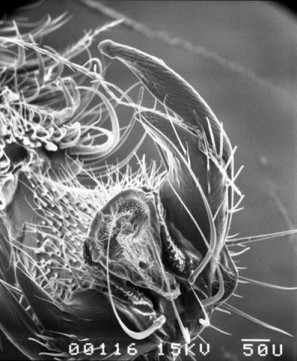 Photo Credit: de Brito Sanchez et al. / Frontiers in Neuroscience Photo Credit: de Brito Sanchez et al. / Frontiers in Neuroscience We here at field school love honeybees, in part for their importance to ecosystems (thanks, pollinators!) and in part because they are really neat and give us delicious honey. Recent research published in Frontiers in Behavioral Neuroscience gives us just one more proof of how darn cool bees are: they taste with their claws to decide whether something is worth eating. Insects taste using their sensilla, which are hair-like structures containing nerve cells sensitive to particular substances. Honeybees have sensilla located on their "mouths", antenna and the end of their legs (which scientists call "tarsi"; you can see the end of one magnified by an electron microscope at the right). This research showed that bees weigh the information they get from their front tarsi to decide whether or not something is worth feeding on. For this experiment, hundreds of bees had their tarsi covered in sugary, salty or bitter liquids, which prompted them to reflexively extend (or retract) their tongues depending on how they liked the taste. Researchers found that the bees used different parts of the tarsi to detect sugary tastes versus salty ones. The ability to taste with their "feet" lets them check a flower for nectar as soon as they land--which means less wasted effort if the flower is dry. The researchers also wondered what would happen if they coated one tarsi with tasty sugar water, and the other with something boring or bitter. They found that honeybees may consider input from both legs when evaluating whether to extend the tongue: if they taste sugar first, they will usually ignore the other leg and extend their tongues. But if they taste something undesirable on one leg first, and then sugar on the other, they're about 50% less likely to extend their tongues. You can check out the original research publication:
Maria Gabriela De Brito Sanchez, Esther Lorenzo, Su Songkung, Fanglin Liu, Yi Zhan and Martin Giurfa. The tarsal taste of honey bees: behavioral and electrophysiological analyses. Front. Behav. Neurosci., 2014 DOI: 10.3389/fnbeh.2014.00025 Or read Science Daily's article on the findings here: Frontiers. "Do you have a sweet tooth? Honeybees have a sweet claw." ScienceDaily. ScienceDaily, 4 February 2014. <www.sciencedaily.com/releases/2014/02/140204162256.htm>.
3 Comments
7/24/2021 09:51:32 am
Amazing blog, I'm very happy to read this blog. Basically, I know new many things to read this blog. I strongly believe that the blog delivers the best information to its audience.
Reply
Tanveer Hasan
3/24/2023 03:39:23 am
Really amazing post. I am really satisfied with this type of information. We know that the internet has a lot of information. But every piece of information is not informative. For many days I have been searching for that type of information that is informative. I am very glad to read this <a href=" https://fambirths.com/january/famous-birthdays-on-1st-january/"> content.
Reply
Leave a Reply. |
Field Notes
Archives
July 2021
Categories |
|
Partner with us! We are always looking for new schools, scientists, and non-profit organizations to partner with. Please contact us here to start a conversation.
Hear from us! Sign up for our newsletter to hear about what is happening at Field School as well as upcoming offers and specials. |

 RSS Feed
RSS Feed